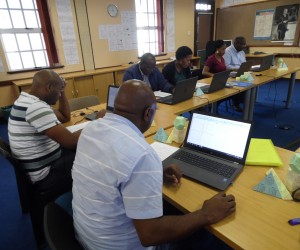Maths and science teachers in previously disadvantaged public schools in KwaZulu-Natal who’ve trained on the Vula Programme have a strong chance of their learners achieving excellent results in this year’s grade-12 maths and science examinations, with the programme hoping that at least 50% of its teachers will achieve a class average of 10% or higher than the provincial average.
The provincial average for maths in 2018 was 50.6% and for science was 74.2%. Learners from about 50 public schools from the Umgungundlovu and Pinetown districts are currently being taught by teachers trained on South Africa’s only residential private-school-based in-service training and development programme for maths and science teachers. The Vula Programme, launched 18 years ago and part-funded by the Datatec Education and Technology Foundation, is cautiously optimistic, based on year-on-year success, that the quality of its training and the hopes and aspirations of its teachers will pave the way for the 10%-or-higher target to be met.
“Success in maths and science is critically important if we want to grow the pool of young people pursuing STEM [science, technology, engineering, maths and medicine] careers. It is vital that we equip our teachers with the necessary skills and confidence in these subjects so that they can support and encourage their learners to excel and rise above their circumstances,” says Wilna de Villiers, Group Marketing and Communications Manager for Datatec. “We remain a firm investor and supporter of the Vula Programme because it is making a meaningful impact at grassroots level across many of the rural communities it serves.
In the 2018 NSC examinations, Umthoqotho School (one of the Vula affiliated schools) recorded an astonishing 100% physical-science pass rate among learners, including three distinctions and four Bs; and more than half of the learners achieved “quality passes”, above 60%. In another instance, Emzamweni School, also under the mentorship of Hilton College’s Vula Programme, recorded a 97.7% pass rate, with two distinctions in physical science.
Commenting on its full line-up of training activities this year, Vula Programme head Lloyd Smuts says, “Our maths project in the first half of this year saw 28 teachers attending 11 weeks of training on the Vula Academy campus at Hilton College, interspersed with smaller creative interventions.” These interventions included 13 teachers in the Pholela and Bergville districts receiving laptops and projects for everyday maths teaching, and a maths Olympiad for 100 grade-11 learners being held in the Uthukela district. Additionally, there was a week-long maths workshop for a grade-12 group from the Bergville district, and two four-day residential workshops at Hilton College for 85 teachers from the King Cetshwayo and Zululand districts.
In the Vula Science Project, more than 500 learners and teachers in rural and township schools received teaching and revision materials, a four-day residential workshop was held for 22 teachers, and groups of learners from local schools were bussed to Hilton College to do practical science work in laboratories. Regular visits to schools in Wartburg, Sweetwaters and Georgetown to assist with practical work and revision were also undertaken.
The 18th annual Vula Careers Day also took place in February, bringing together 500 grade 12 learners and teachers from 12 schools under Vula training. A large number of exhibitors gave attendees a glimpse into future career prospects, with a focus specifically on careers that require excellent grade 12 results in maths and science.
The Datatec Foundation funds educational organisations whose purpose is to improve education within underprivileged communities in South Africa. Datatec’s corporate social investment (CSI) spend is directed into educational initiatives consisting of school-level intervention programmes for learners and teachers, and educational bursaries. Other initiatives include the provision of technology infrastructure and skills development for unemployed youth.
Through the support of school-level intervention programmes in maths and science, the Datatec Foundation has been able to directly benefit 4 300 learners and 500 teachers. Better-skilled teachers indirectly benefit over 100 000 learners in various parts of the country.







